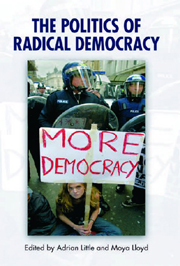Book contents
- Frontmatter
- Contents
- Acknowledgements
- Notes on the Contributors
- Introduction
- 1 Rhetoric and Radical Democratic Political Theory
- 2 Performing Radical Democracy
- 3 Aboriginal Sovereignty and the Democratic Paradox
- 4 Judith Butler, Radical Democracy and Micro-politics
- 5 Post-structuralism, Civil Society and Radical Democracy
- 6 Hegemony and Globalist Strategy
- 7 Is ‘Another World’ Possible? Laclau, Mouffe and Social Movements
- 8 Friends and Enemies, Slaves and Masters: Fanaticism, Wendell Phillips and the Limits of Agonism
- 9 The Northern Ireland Paradox
- Conclusion
- Bibliography
- Index
7 - Is ‘Another World’ Possible? Laclau, Mouffe and Social Movements
Published online by Cambridge University Press: 12 September 2012
- Frontmatter
- Contents
- Acknowledgements
- Notes on the Contributors
- Introduction
- 1 Rhetoric and Radical Democratic Political Theory
- 2 Performing Radical Democracy
- 3 Aboriginal Sovereignty and the Democratic Paradox
- 4 Judith Butler, Radical Democracy and Micro-politics
- 5 Post-structuralism, Civil Society and Radical Democracy
- 6 Hegemony and Globalist Strategy
- 7 Is ‘Another World’ Possible? Laclau, Mouffe and Social Movements
- 8 Friends and Enemies, Slaves and Masters: Fanaticism, Wendell Phillips and the Limits of Agonism
- 9 The Northern Ireland Paradox
- Conclusion
- Bibliography
- Index
Summary
The slogan ‘another world is possible’ is regularly seen on anti-capitalist protests and the publications of critics of the current system. For these critics, the ugly face of neo-liberalism – massive poverty and exclusion, exploitation, immiseration, ecological destruction, the perpetuation of a wide range of oppressive and destructive relations, permanent emergency and war – is a human construction that can be reversed or overcome.
As radicals, Laclau and Mouffe would no doubt embrace certain aspects of this movement. But do they believe in this core proposition? In certain ways, Laclau and Mouffe do allow for the possibility of social change through rearticulations and changes in which a group is hegemonic. But in other ways, the core structure of the current system is put beyond challenge in their approach. There is only one way to ‘do politics’, which is to seek to represent a multitude of floating signifiers under the umbrella of a despotic signifier; ultimately this means a statist politics, complete with exclusions, violence, alienation and the rest. This is Laclau and Mouffe's major contribution to the strategies of social movements, urging radical activists and single-issue campaigners to give up on goals of revolution, overthrow and fundamental transformation and instead pursue hegemonic rearticulations which play by the rules of liberal democracy and recognise their own particularity and resultant subordination to the state's regulatory function. This would be a dreadful pessimism were it not for the fact that they also celebrate the possibilities of this ‘radical democratic’ practice, constructing a quasi-teleological account of its progress into an ever-expanding democracy.
- Type
- Chapter
- Information
- The Politics of Radical Democracy , pp. 133 - 157Publisher: Edinburgh University PressPrint publication year: 2008

